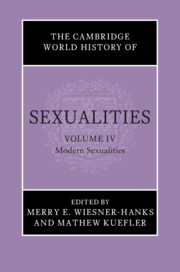Book contents
- The Cambridge World History of Sexualities
- The Cambridge World History of Sexualities
- The Cambridge World History of Sexualities
- Copyright page
- Contents
- Figures in Volume IV
- Contributors to Volume IV
- Editors’ Preface to the Series
- 1 Sexuality and Capitalism
- 2 Colonialism and Modern Sexuality
- 3 Gender, Migration, and Sexuality in the Modern World
- 4 ‘Pornography’, ‘Obscenity’, and the Suppression of Libertine Literature
- 5 Sexuality and the Print Media in the Modern World
- 6 Eugenics, Public Health, and Modern Sexuality
- 7 Sexuality and Consumerism in the Modern World: The Business of Pleasure
- 8 Sex Education in the Modern World
- 9 Birth Control and Reproductive Rights in the Modern World
- 10 The Impact of the World Wars on Modern Sexuality
- 11 Sexualities and Dictatorships of the Twentieth Century
- 12 Sexuality in Post-war Liberal Democracies
- 13 The Sexual Revolution
- 14 Sex Tourism: Fluid Borders of Meanings and Practices
- 15 The History of AIDS since 1981: Medicine, Politics, and Societies in a Pandemic
- 16 Sex Trafficking in the Modern World
- 17 Sex, Law, and Domestic Violence against Women in the Modern World
- 18 Sexuality under Attack Now
- Index
- Contents to Volumes I, II, and III
- References
16 - Sex Trafficking in the Modern World
Published online by Cambridge University Press: 26 April 2024
- The Cambridge World History of Sexualities
- The Cambridge World History of Sexualities
- The Cambridge World History of Sexualities
- Copyright page
- Contents
- Figures in Volume IV
- Contributors to Volume IV
- Editors’ Preface to the Series
- 1 Sexuality and Capitalism
- 2 Colonialism and Modern Sexuality
- 3 Gender, Migration, and Sexuality in the Modern World
- 4 ‘Pornography’, ‘Obscenity’, and the Suppression of Libertine Literature
- 5 Sexuality and the Print Media in the Modern World
- 6 Eugenics, Public Health, and Modern Sexuality
- 7 Sexuality and Consumerism in the Modern World: The Business of Pleasure
- 8 Sex Education in the Modern World
- 9 Birth Control and Reproductive Rights in the Modern World
- 10 The Impact of the World Wars on Modern Sexuality
- 11 Sexualities and Dictatorships of the Twentieth Century
- 12 Sexuality in Post-war Liberal Democracies
- 13 The Sexual Revolution
- 14 Sex Tourism: Fluid Borders of Meanings and Practices
- 15 The History of AIDS since 1981: Medicine, Politics, and Societies in a Pandemic
- 16 Sex Trafficking in the Modern World
- 17 Sex, Law, and Domestic Violence against Women in the Modern World
- 18 Sexuality under Attack Now
- Index
- Contents to Volumes I, II, and III
- References
Summary
Human trafficking is a juridical concept invented in the nineteenth century that reappeared in the late twentieth century. The concept was created amid discussions about policing of national borders and reflected panics concerning the ideal of feminine purity, when women were seen in the discourse of the time as needing protection. In this chapter we will show how discourse in support of combating human trafficking for sexual exploitation has used ideas about gender and raciality to justify policies to contain migration. The twentieth century was marked by conquests of women”s rights, and white women are no longer seen as being in need of protection as were those of the nineteenth century. However, attributes that are both accusatory and victimizing still weigh on non-white women, especially when they are involved in sex work across national borders. In these terms, there is no space for women understood as victims of trafficking for sexual exploitation to be able to affirm their labour demands based on their own understandings about what constitutes sex work, violence, and exploitation.
Keywords
- Type
- Chapter
- Information
- The Cambridge World History of Sexualities , pp. 342 - 357Publisher: Cambridge University PressPrint publication year: 2024



